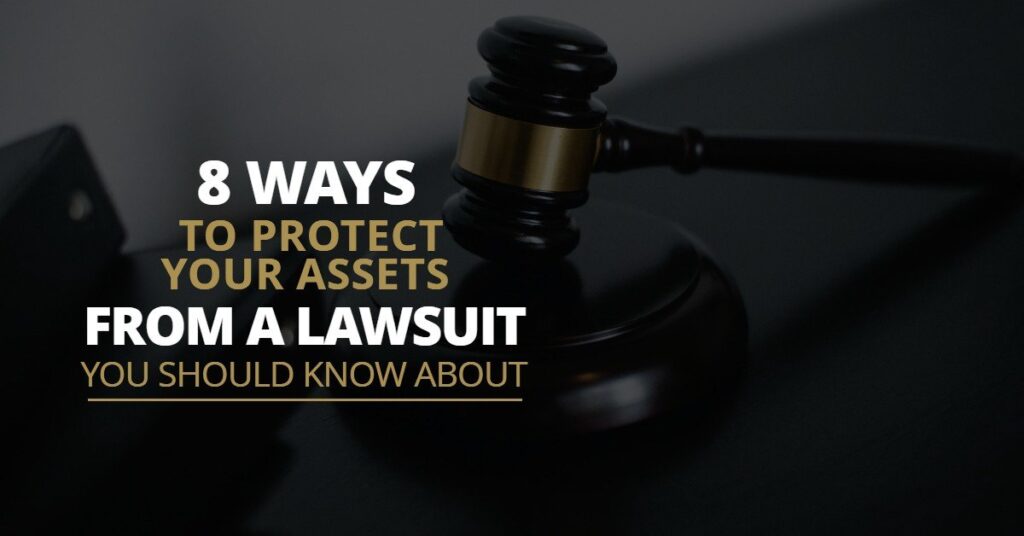Looking to safeguard your hard-earned assets from potential lawsuits? We’ve got you covered. In this article, we will guide you through effective strategies on how to protect your assets from lawsuits, ensuring you can rest easy knowing your financial well-being is secure. By implementing these practical tips, you can proactively shield your wealth and minimize the risk of losing it in legal battles. So, let’s dive right in and explore the best practices for safeguarding your assets from potential lawsuits.
How to Protect Your Assets from Lawsuits
When it comes to safeguarding your hard-earned assets, taking necessary precautions to protect them from potential lawsuits is crucial. Lawsuits can arise from various situations, including accidents, professional negligence, or business disputes. Implementing asset protection strategies can help shield your wealth from such legal claims and ensure your financial security. In this article, we will explore effective ways to protect your assets from lawsuits and secure your future.
1. Understand the Importance of Asset Protection
Before diving into specific strategies, it’s important to grasp why asset protection is essential. By shielding your assets from legal claims, you can:
- Maintain financial stability: Safeguarding your assets helps you protect your financial stability and ensure that you have resources for future needs.
- Preserve your wealth: Asset protection measures can help you preserve your wealth for future generations, ensuring a lasting legacy.
- Reduce litigation risks: By implementing effective asset protection strategies, you can discourage potential lawsuits and minimize your exposure to legal risks.
2. Separate Personal and Business Assets
A crucial step in protecting your assets from potential lawsuits is separating your personal and business assets. This separation creates a legal distinction between your personal wealth and your business assets, reducing the chances of a lawsuit against your personal assets affecting your business and vice versa. Here’s what you can do:
- Establish a legal entity: Consider forming a Limited Liability Company (LLC), a corporation, or a trust to separate your personal and business assets. These legal entities provide protection by limiting your personal liability.
- Maintain proper records: Keep thorough and accurate records of your personal and business finances, ensuring a clear distinction between the two.
- Avoid commingling funds: Never mix personal and business funds. Maintain separate bank accounts and be diligent about keeping your personal and business expenses separate.
3. Purchase Adequate Insurance Coverage
Obtaining comprehensive insurance coverage is an integral part of protecting your assets. Insurance policies provide financial protection in the event of an unforeseen accident or liability. Here are some types of insurance coverage to consider:
- Homeowners insurance: Protects your home and personal belongings from damage or liability claims arising from accidents on your property.
- Auto insurance: Provides coverage for property damage and medical expenses resulting from accidents involving your vehicles.
- Liability insurance: Protects you from potential legal claims and provides financial coverage for legal defense costs, court settlements, and judgments.
- Professional liability insurance: Essential for professionals such as doctors, lawyers, and consultants, this coverage protects against claims of professional negligence or malpractice.
- Umbrella insurance: Offers additional liability coverage that extends beyond the limits of your primary insurance policies, providing an extra layer of protection.
4. Maximize Retirement Account Contributions
Retirement accounts, such as Individual Retirement Accounts (IRAs) and 401(k)s, offer significant asset protection benefits. These accounts provide a shield against creditors and lawsuits, making them an excellent tool for asset protection. Here’s how you can leverage retirement accounts:
- Contribute regularly: Maximize your contributions to retirement accounts, taking advantage of any employer matching programs.
- Explore self-directed IRAs: Consider self-directed IRAs that allow you to invest in a wide range of assets, including real estate and private businesses, diversifying your holdings and potentially increasing your asset protection.
- Understand creditor protection laws: Familiarize yourself with the specific laws in your jurisdiction regarding the level of asset protection provided by retirement accounts.
5. Create Trusts for Asset Protection
Utilizing trusts can be an effective strategy to protect your assets from lawsuits. Trusts establish a legal framework for holding and transferring assets, often providing enhanced protection compared to personal ownership. Consider the following types of trusts:
- Revocable living trusts: While primarily used for estate planning purposes, revocable living trusts can also offer some asset protection benefits. They allow you to maintain control over your assets while avoiding probate proceedings.
- Irrevocable trusts: By transferring assets into an irrevocable trust, you remove them from your personal ownership, thereby protecting them from potential legal claims. However, keep in mind that irrevocable trusts generally require you to relinquish control over the assets.
- Asset protection trusts: Some jurisdictions offer specific trusts designed explicitly for asset protection. These trusts often provide stronger shields against creditors and legal claims.
6. Consider Family Limited Partnerships
Family Limited Partnerships (FLPs) are another effective asset protection tool, particularly for individuals with significant wealth or business assets. An FLP combines elements of a partnership and a corporation, allowing you to protect and control your assets. Here’s how it works:
- Establish the partnership: Create a partnership agreement and designate yourself as the general partner with control over the assets. Family members can be designated as limited partners.
- Transfer assets to the partnership: Transfer your assets, such as real estate, investments, or business interests, into the partnership.
- Retain control as the general partner: As the general partner, you maintain control over the assets and management decisions, while limited partners have limited control and liability.
- Enjoy asset protection benefits: Creditors can only access limited partners’ interests in the partnership, providing a shield for your personal wealth.
7. Consult with an Asset Protection Attorney
Due to the complexity of asset protection strategies and the varying legal regulations, seeking professional guidance from an experienced asset protection attorney is advisable. An attorney specializing in asset protection can help you:
- Assess your specific needs: An attorney will evaluate your assets and financial situation to tailor a customized asset protection plan.
- Navigate legal complexities: Asset protection laws can be intricate, and an attorney will ensure that you comply with all the necessary legal requirements.
- Optimize strategies: With their expertise, an asset protection attorney can recommend the most effective strategies based on your goals and circumstances.
Remember, asset protection should be approached proactively, as implementing strategies after a lawsuit is imminent may lead to legal consequences. By being proactive, you can safeguard your assets and protect your financial well-being. Consult with professionals and take the necessary steps to protect what you have worked so hard to achieve.
How the RICH Protect Assets From Lawsuits
Frequently Asked Questions
Frequently Asked Questions (FAQs)
1. How can I protect my assets from lawsuits?
There are several strategies you can employ to protect your assets from lawsuits. Some common approaches include:
- Estate planning: Creating a comprehensive estate plan can help protect your assets by specifying how they should be distributed and potentially placing them in trusts.
- Asset protection trusts: These specialized trusts can shield your assets from lawsuits by transferring their ownership to the trust.
- Business entity formation: Structuring your business as a limited liability company (LLC) or corporation can provide personal liability protection.
- Insurance coverage: Obtaining adequate insurance coverage, such as liability insurance or umbrella policies, can help protect your assets.
- Homestead exemption: Taking advantage of homestead exemption laws can safeguard your primary residence from certain creditors.
2. What is the significance of a living trust in asset protection?
A living trust, also known as a revocable trust, can be an effective tool for protecting your assets. By transferring your assets to the trust, you maintain control over them while ensuring they are protected from potential lawsuits and creditors. Additionally, a living trust allows for the smooth transfer of assets to beneficiaries upon your passing, avoiding the probate process.
3. Can transferring assets to my spouse help protect them from lawsuits?
Transferring assets to your spouse can provide some level of protection, particularly if your spouse is not involved in the activities that could lead to a lawsuit. However, it’s important to note that fraudulent transfers made solely to avoid creditors can be challenged and potentially reversed by the courts. Consulting with a legal professional is recommended to determine the best approach for your specific situation.
4. Are there any time limitations for asset protection strategies?
Yes, there are time limitations for implementing certain asset protection strategies. Transferring assets shortly before a lawsuit emerges can be deemed as fraudulent conveyance, and the transferred assets may still be vulnerable to creditors’ claims. It is advisable to implement asset protection strategies well in advance of any potential legal threats.
5. Do retirement accounts offer asset protection?
In many cases, retirement accounts such as 401(k)s and IRAs offer a certain degree of asset protection. Federal laws provide safeguards, making these accounts less susceptible to creditors’ claims. However, the level of protection can vary depending on the specific circumstances and applicable state laws. Seeking guidance from a financial advisor or attorney specializing in asset protection is crucial.
6. Can I protect my assets if I am already facing a lawsuit?
Asset protection strategies implemented after a lawsuit has been filed may not be effective and could be considered fraudulent conveyance. It’s important to consult with an attorney as soon as possible if you are facing a lawsuit to explore your options and determine the best course of action.
7. What should I do to protect personal assets while operating a business?
Separating your personal assets from your business is essential for protecting them from potential lawsuits against the business. To achieve this, consider forming a separate legal entity such as an LLC or corporation. Additionally, maintaining proper accounting practices, obtaining liability insurance, and seeking legal guidance can further protect your personal assets.
8. Can I use offshore trusts to protect my assets from lawsuits?
Offshore trusts can be used as part of an asset protection strategy in certain cases. However, there are complex legal and tax considerations associated with offshore trusts, and their effectiveness can vary depending on the jurisdiction and specific circumstances. Consulting with an attorney experienced in offshore asset protection is crucial before pursuing this strategy.
Final Thoughts
Protecting your assets from lawsuits is crucial in safeguarding your financial well-being. One effective strategy is to establish a trust, which separates your personal assets from potential legal liabilities. Consulting with an experienced attorney who specializes in asset protection can provide valuable guidance tailored to your specific circumstances. Additionally, maintaining adequate liability insurance coverage and regularly reviewing and updating your estate plan are essential steps to protect your assets. Taking proactive measures such as organizing your financial affairs and diversifying your investments can further mitigate the risk of losing your hard-earned assets. By implementing these strategies, you can effectively protect your assets from lawsuits and secure your financial future.

